Integrative Approach Key to Combat Climate Impacts on Health and Agriculture in Mindanao
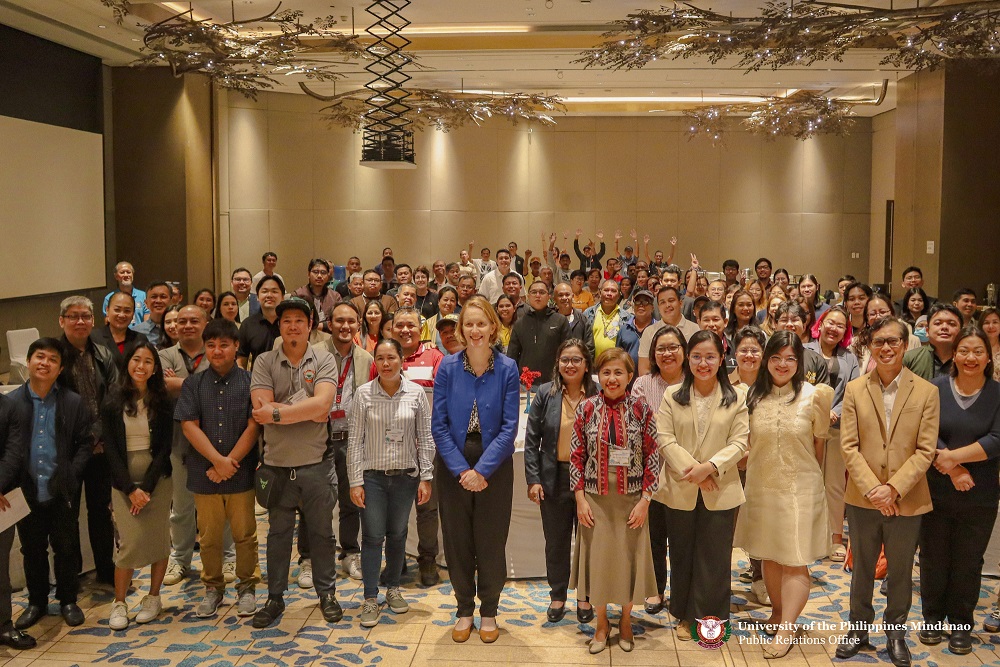 |
| The personalities at the South South Climate Information Services conference |
Various stakeholders emphasizes the need for collaboration and an integrative approach to knowledge to combat climate change and its effects on agriculture and health during the conference "Climate Information Services in Health and Agriculture Research: The Mindanao Perspective" held last July 23-24, 2024, at the Acacia Hotel, Davao City.
The two-day event is organized by the German Development Cooperation (GIZ Philippines) South-South Collaboration on Climate Information and Services (SSCIS) Project in collaboration with the University of the Philippines (UP) Mindanao and the Ateneo de Davao University.
The SSCIS Project aims to promote effective and resilient communities in the Philippines through the use of climate information services (CIS) for decision making in planning and implementing climate change adaptation and mitigation measures, focusing on the agriculture and health sectors. The project aims to make climate information available, enhance the capacity of different sectors to use this information, and provide other related services.
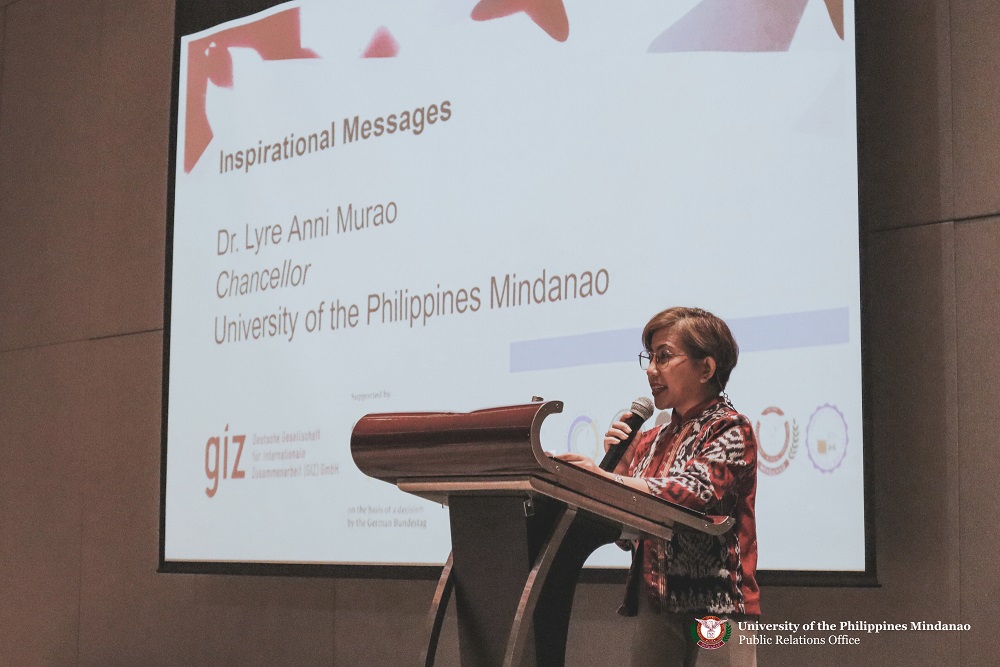 |
| Chancellor Lyre Anni Murao |
In her inspirational message, UP Mindanao chancellor Lyre Anni E. Murao emphasized the need for integrative and transdisciplinary approaches for healthy and resilient communities. A virologist and health researcher, Murao cited the 'One Health' approach as an example of interdisciplinary perspective where the interconnectedness of human, animal, plant, and environmental health is emphasized.
"By adopting this integrative perspective, we need to start thinking 'trans-disciplinal'," Murao added. "By 'transdisciplinal,' I do not only mean the crossing of knowledge from one discipline to another, but also the bridging of the gap between academic knowledge derived from research and everyday pragmatic local knowledge derived from the lived experiences of people in government, industry, and other sectors and the Indigenous wisdom of the Lumad, Muslim, and other cultural communities. People outside academia have forms of knowledge that when fused with academic knowledge can generate more effective solutions to the grand challenges of the 21st century."
Dr. Nicole Kranz, Principal Adviser of the SSCIS Project, echoes this sentiment and emphasizes the goal of fostering collaboration between farmers and scientific experts.
"We invited 52 farmers from six cooperatives working in cacao and coconut production to actively exchange with scientific experts... and get the latest on recent agricultural research in fisheries as well as in health aspects...to receive feedback to make research applicable to the local level... and this includes the Indigenous communities in setting up CIS and systems leaning in traditional knowledge and local experience," Kranz stated.
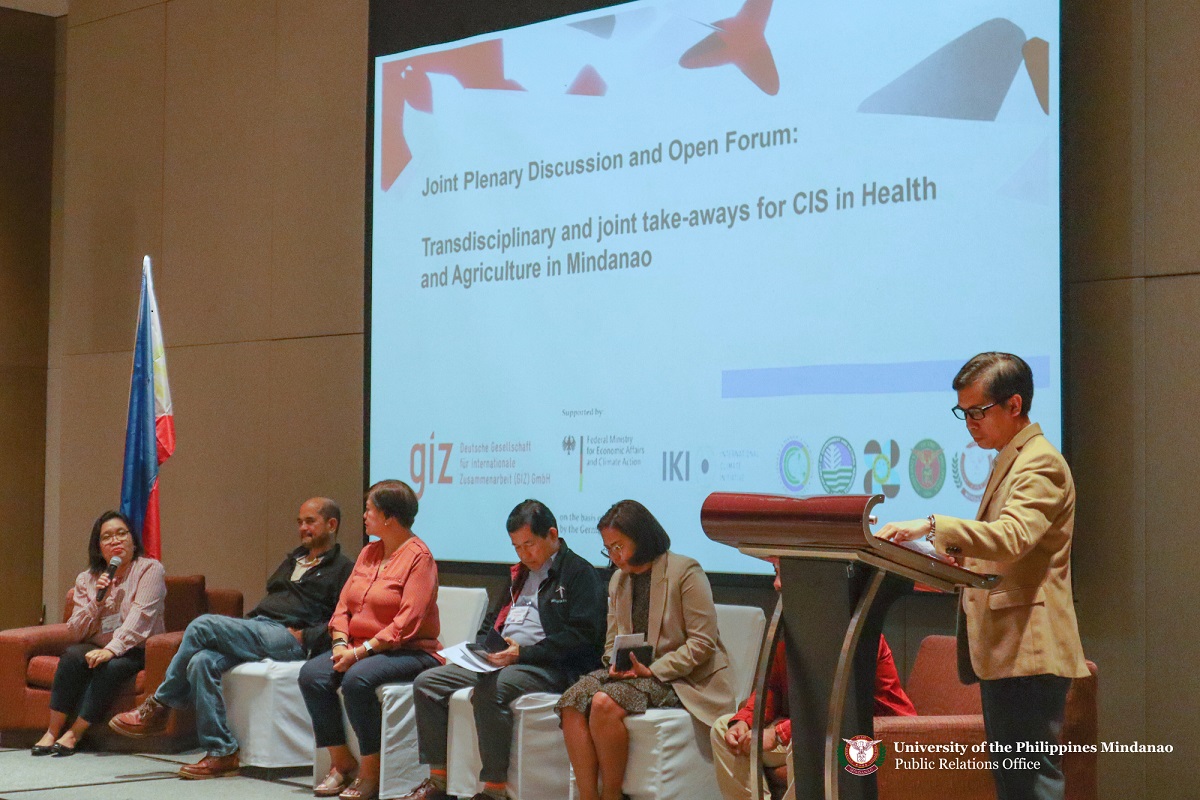 |
| UP Mindanao's Professor Aleyla de Cadiz speaks at the panel discussion. Seated beside her is CSM Dean Cleto Nanola Jr. |
On the first day of the conference, government agencies, researchers, and farmers in Mindanao engaged in an open forum discussing the region's climate and CIS activities. A representative from one of the Farmer Cooperatives in Mindanao expresses the need for trust and clear communication between all stakeholders, particularly national government agencies, state universities and colleges, and local government units. He pointed out that farmers often struggle to understand complex research findings, which can lead to underutilization of valuable information. He emphasized that effective communication of research results is essential for farmers to successfully adopt new, sustainable, and efficient practices.
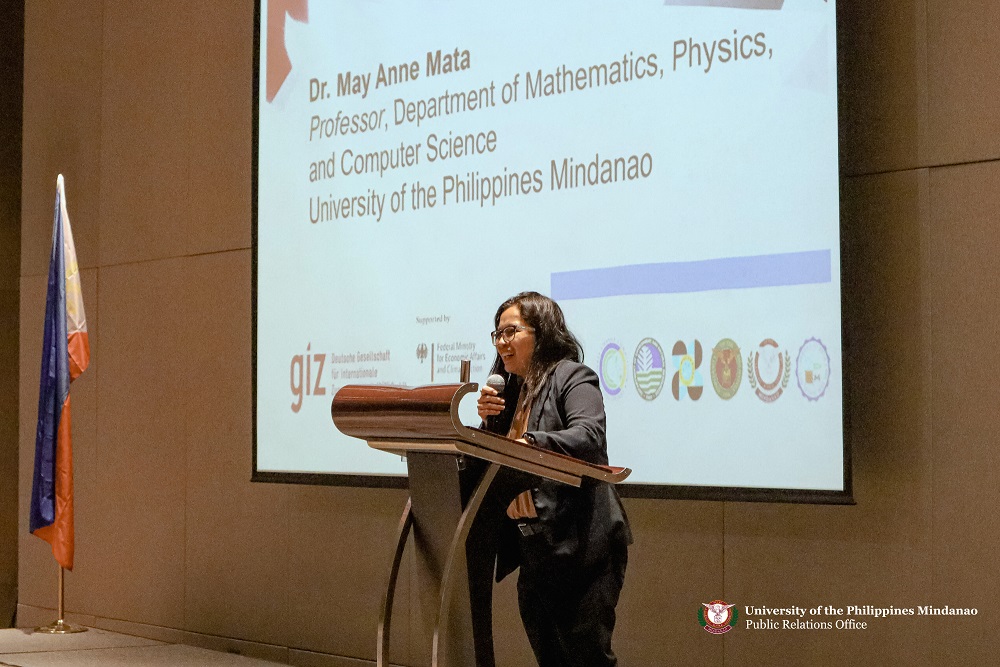 |
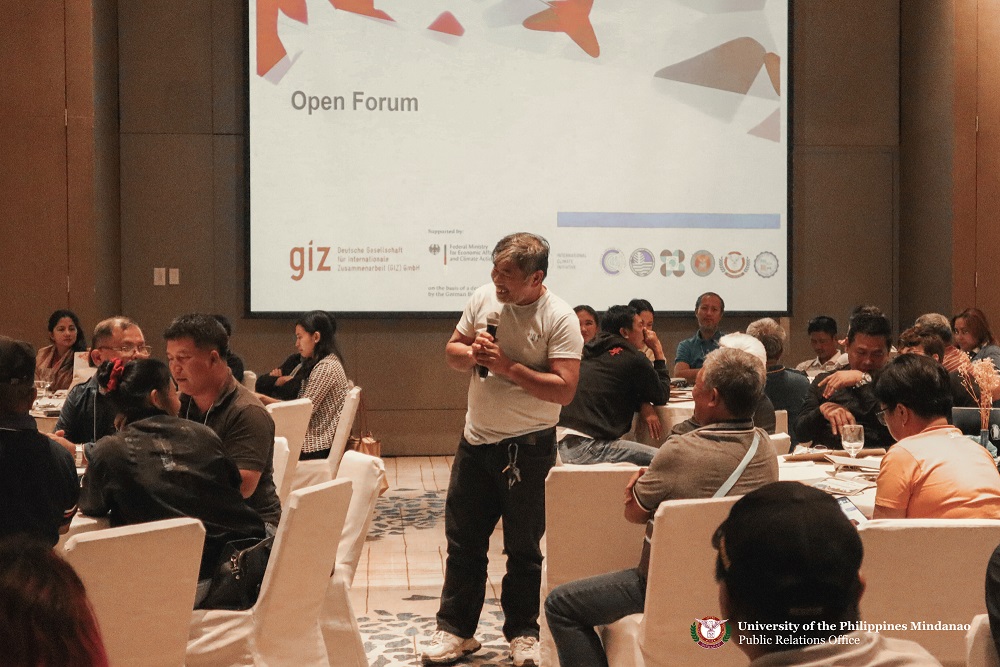 |
| Prof. May Anne Mata | A farmer gives feedback |
The rest of the conference consisted of presentations related to climate from PAGASA, Banko Sentral ng Pilipinas, Ateneo de Davao University, UP Mindanao, and National Commission for Indigenous Peoples. as well as breakout sessions and open forum. Among other attendees of the conference are representatives from Climate Change Commission, UP Manila National Institutes of Health, UP Los Banos Integrated Natural Resources and Environment Management (INREM), Mindanao Development Authority, Climate Resilient Agriculture Office of the Department of Agriculture, Department of Environment and Natural Resources, PAGASA, Department of Health, local government units in the Davao Region, Kennemer Foods, and farmer cooperatives in Mindanao.
Prof. May Anne E. Mata, UPMin professor and director for research, presents UPMin's initiatives on Climate Information Services in Mindanao. The conference showcases contributions from the academe and institutions that elevate Mindanao-based research. UPMin's Mindanao Center for Disease Watch & Analytics (DiWA) presents various research papers related to health and agriculture in Mindanao.
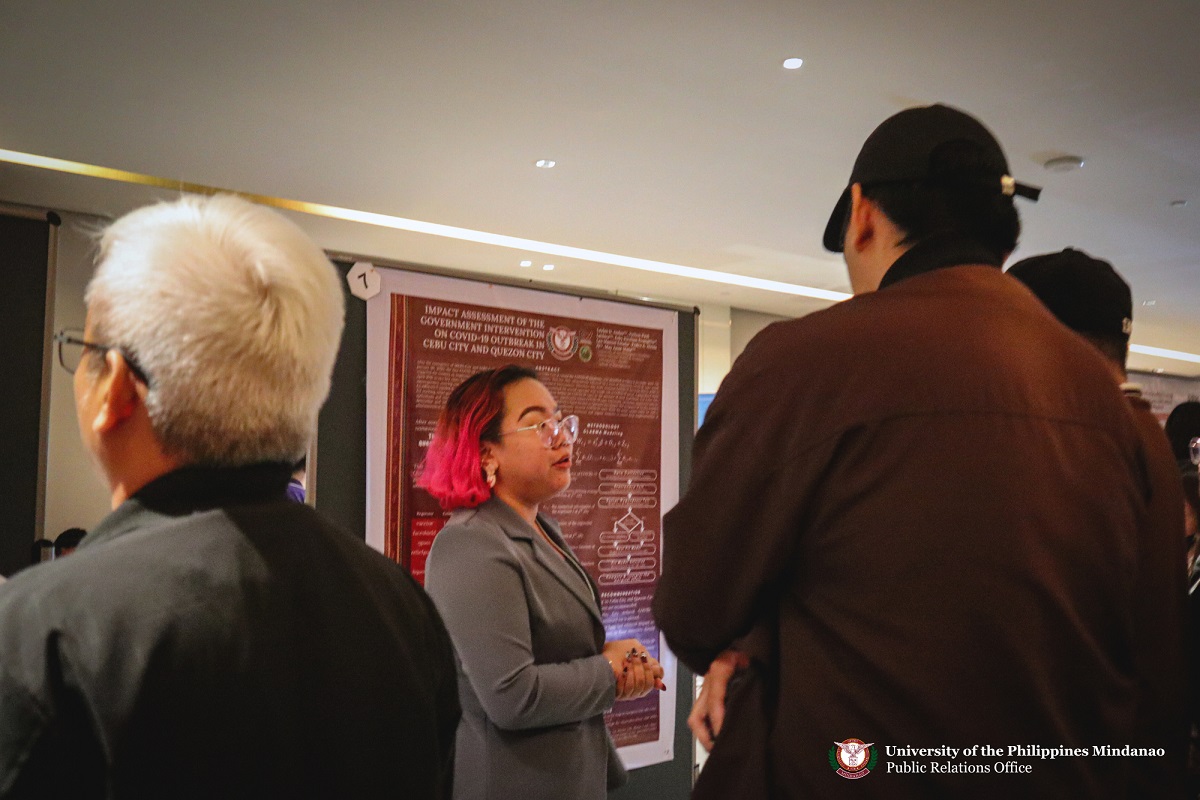 |
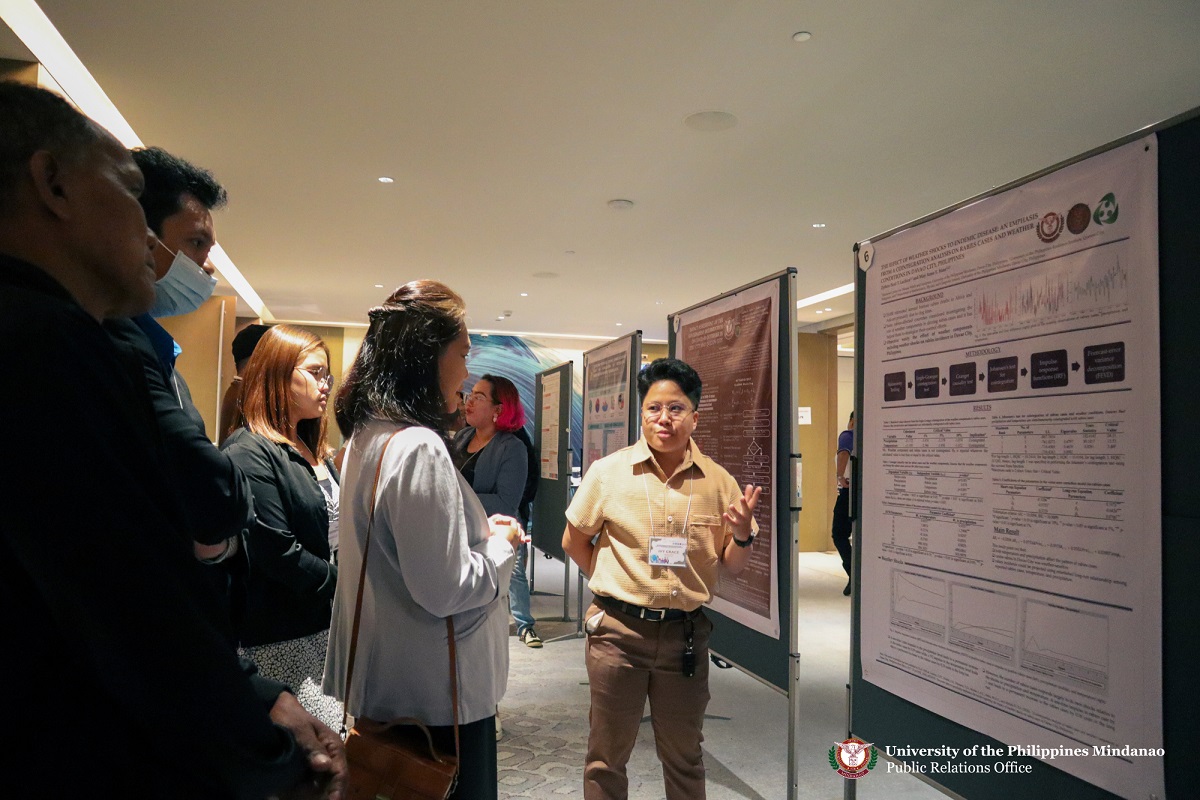 |
| UP Mindanao researchers present their research posters |
UPMin College of Science and Mathematics dean Prof. Cleto L. Nañola and Prof. Aleyla E. de Cadiz are among the panelists during the sessions on transdisciplinary and joint takeaways for Climate Information Services in Health and Agriculture in Mindanao.
In closing, GIZ consultant Jaker de Claro discussed the importance of building communities and having a community charter as a guide to establishing networks, launching communities, sustaining rhythm, and maturing a community of practice. He highlighted the diverse composition of the COP, which encompasses stakeholders from national government agencies, SUCs, research institutions, think tanks, LGUs, private sector, NGOs, and media. These stakeholders contribute to capacity development, engaging stakeholders, providing coaching and mentoring, and sharing best practices geared towards fostering community resilience.
The conference underscores UP Mindanao's commitment to leveraging research and collaboration to address climate challenges effectively, fostering resilience and sustainable development in Mindanao and beyond.
Written by: KC Ann Neljane Abella
